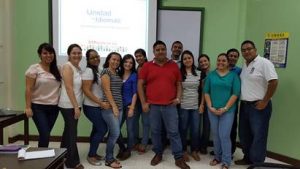-
What We Do
- WHERE WE WORK
-
About Us
 Welcome Message from Carol Jenkins
Welcome Message from Carol JenkinsFor more than 90 years, World Learning has equipped individuals and institutions to address the world’s most pressing problems. We believe that, working together with our partners, we can change this world for the better.
On my travels, I’ve had the opportunity to meet with many of those who have joined us in this mission. In Baghdad, we’ve trained more than 2,300 Iraqi youth who are already giving back at home. In London, our partners in the TAAP Initiative strongly believe that we are all responsible to practice inclusion. And in Vermont, our Experiment in International Living and School for International Training participants prove every day that they have the tools and the determination to change the world.
Please join us in our pursuit of a more peaceful and just world.
- Get Involved
Media Center > Story
In El Salvador, This Educator is Transforming How Students Learn English
September 6, 2017
Two years ago, the Universidad Autonoma de Santa Ana had a problem: Students were getting bored with their English classes. The curriculum simply didn’t seem relevant. Though the Salvadoran university offers studies in various disciplines like medicine, dentistry, communications, and physical education, its English classes were generic — and sometimes even backwards, forcing medical students to write newspaper articles and communications students to role-play scenes in a hospital.
“I believe students deserve a different way of learning,” says Mike Hernandez, coordinator of the university’s language department. But he wasn’t sure what that new way might be until a colleague encouraged him to enroll in a 10-day workshop organized by World Learning’s Higher Education for Economic Growth Project, a USAID-funded initiative that aims to transform El Salvador’s system of higher education. There, Hernandez learned about an innovative teaching methodology that perfectly addressed the disconnect his students were facing.
English for Specific Purposes (ESP) is a teaching system in which both content and method are hyper-focused to meet the needs of English language learners from business and science to tourism and the arts. Though it has been around since the 1960s, experts say ESP is still gaining traction in educational circles. Hernandez had never heard of it until the workshop. “It opened my mind and eyes,” he says. “I thought, this is what my university needs.”
 Immediately upon his return to Santa Ana, Hernandez created the Universidad Autonoma de Santa Ana’s first ESP program. English language classes for medical students would include units like Hospital Staff, The Body, and Body Systems like the circulatory or respiratory systems. Communications students would learn the vocabulary and grammar they needed for careers in web design, podcasting, video, and more. “We changed everything,” he says.
Immediately upon his return to Santa Ana, Hernandez created the Universidad Autonoma de Santa Ana’s first ESP program. English language classes for medical students would include units like Hospital Staff, The Body, and Body Systems like the circulatory or respiratory systems. Communications students would learn the vocabulary and grammar they needed for careers in web design, podcasting, video, and more. “We changed everything,” he says.
Of course, rapid change brings its own challenges. Hernandez says that teachers and students alike were wary of the new program when he introduced it. Teachers worried it would take them too long to redesign their curriculum around the principles of ESP, and they also feared they wouldn’t know how to teach medical or other technical vocabulary. Meanwhile, students lamented the shift in focus from writing to speaking English.
But those growing pains faded quickly. “At the end, teachers loved it and now they’re using it every time in class,” Hernandez says. Students, too, warmed to the new class structure to the point where he had to double the university’s offering of English language courses. “So it works,” he says. “It was awesome.”
 Hernandez has continued to build on that success both in El Salvador and abroad. Earlier this year, he traveled to Bulgaria with the U.S. Department of State to teach ESP to teachers there. “They were like, wow this is amazing, where did you learn that?” he says. “I said, I learned it in El Salvador.” He has also been talking with fellow educators in El Salvador about training budding teachers in ESP throughout their own studies. “I think that’s the future,” he says.
Hernandez has continued to build on that success both in El Salvador and abroad. Earlier this year, he traveled to Bulgaria with the U.S. Department of State to teach ESP to teachers there. “They were like, wow this is amazing, where did you learn that?” he says. “I said, I learned it in El Salvador.” He has also been talking with fellow educators in El Salvador about training budding teachers in ESP throughout their own studies. “I think that’s the future,” he says.
He has bigger plans for developing higher education in El Salvador as well. Hernandez has recently applied for a $20,000 grant from the U.S. Embassy in San Salvador to launch a project that would train Salvadoran teachers in inclusive education for people with learning disabilities. The project would also host workshops for parents, administrators, and students.
As Hernandez waits to find out whether the project will win its funding, he hopes to see even more opportunities for educators in El Salvador and Central America. He’s particularly interested in expanded Teaching English to Speakers of Other Languages (TESOL) programming, for example, or initiatives like World Learning Algeria’s STEAM Center, which promotes science, tech, engineering, arts, and mathematics among the country’s youth. “World Learning is about empowering people, communities, institutions, and teachers,” he says. “We have some ideas too.”





